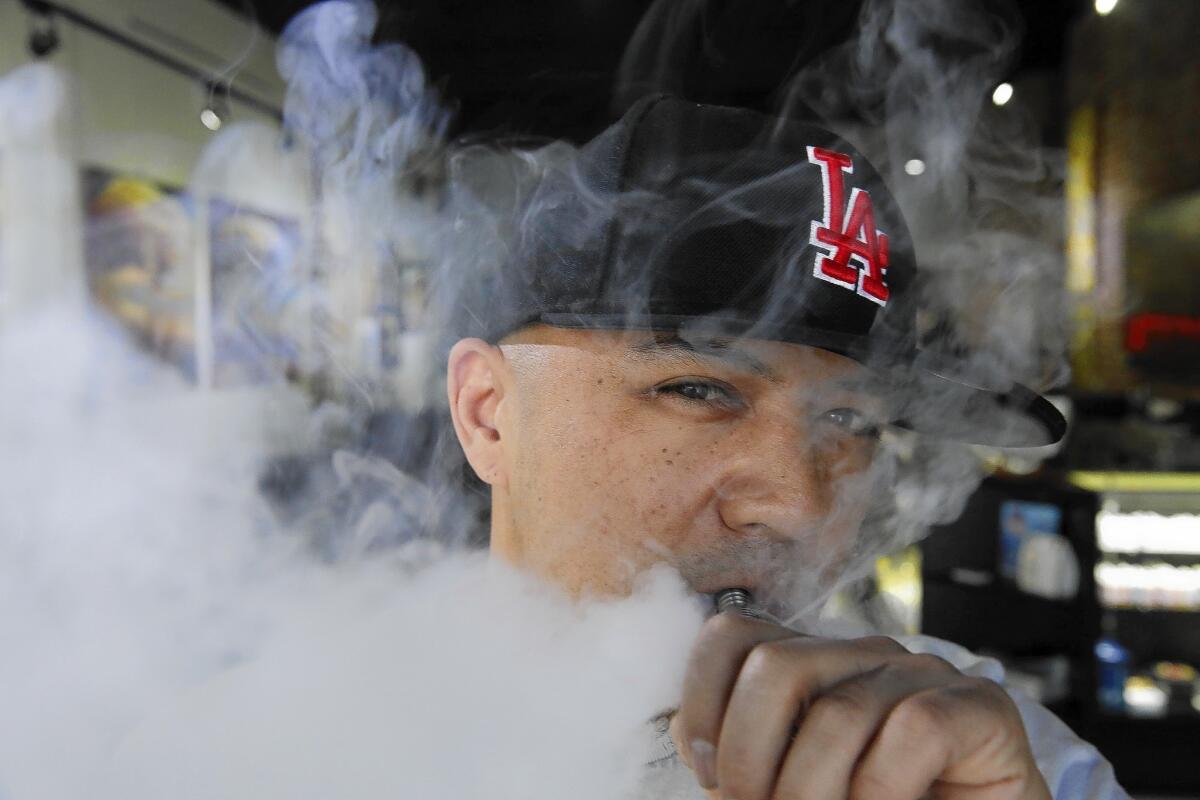Proposed rules on vaping spark debate

- Share via
A new federal proposal to regulate electronic cigarettes has Patrick Sanchez pondering the future of the fledgling industry.
Sanchez is the owner of Vapegoat, a Highland Park e-cigarette shop that doubles as an art gallery. On a normal night, customers kick back on his comfy couches, surrounded by brick walls hung with Salvador Dali-esque paintings, and try out new e-cig flavors.
Since opening in September, Sanchez said, business has boomed as more smokers discovered the battery-operated devices, which heat liquids that usually contain nicotine to create a vapor that can be inhaled.
“Sales have increased 20% a month,” he said.
Still, Sanchez and many other local shop owners and manufacturers worry that the new rules proposed Thursday by the Food and Drug Administration are simply the beginning of more efforts to rein in the $2-billion industry.
The FDA is proposing to extend its authority to e-cigarettes. The proposal includes banning sales to minors and requiring manufacturers to place health warnings on e-cigarettes about the addictive quality of nicotine. Manufacturers also would have to register their products and ingredients with the FDA, and provide scientific proof before making any health claims.
The regulations — which must go through a public comment process and overcome potential legal challenges before becoming final — would impose restrictions on other tobacco-related products as well, including nicotine gels and pipe tobacco.
Regulating e-cigarettes brings up thorny issues because the health effects of these devices are still unclear.
E-cigarette companies argue that their products give smokers a way of getting nicotine without exposure to carcinogens found in traditional cigarettes. Opponents say that the long-term health effects are still unknown, and that minors are especially drawn to the advertising and array of flavors.
Many e-cigarette users doubt any FDA warning would scare them away from buying more. Josh Adam Myers of Hollywood said e-cigarettes helped him kick a two-pack-a-day cigarette habit two years ago. Since then, the 34-year-old said, he has gone from wheezing when climbing a hill, to running five days a week.
“If they told me it caused extreme elephantitis, I would quit right away,” joked Myers. “But if they told me it caused cancer, I would say: ‘How do you know? No one knows.’”
Many local businesses said they are worried about potentially industry-choking rules in the future.
The growing use of e-cigarettes has already spurred some cities to restrict their use. Last week in Los Angeles, an ordinance went into effect banning e-cigarette use in public places such as restaurants, parks and beaches.
Many public health advocates and some members of Congress have called for additional restrictions on television advertisements and flavorings, such as pumpkin spice or chocolate, that may target younger consumers. The FDA stopped short of taking these steps Thursday, but officials have indicated more oversight is coming.
Sanchez, the Vapegoat owner, said he supports any rules that protect children. But restricting flavors, he said, would take away a major part of the product’s appeal.
“If this is the start of regulations, who knows what else is coming?” he said. “These flavors are tasty because adults like them. That is what makes them popular and successful.”
The regulations come as a flurry of companies have jumped into the booming market in recent years, opening stores and creating new products.
An e-cigarette culture has developed, with aficionados gathering at lounges to debate the finer points of hardware and flavors. Some industry lingo has even gained mainstream appeal: “Juices” are the flavored liquids that often contain nicotine, and “vaping” refers to the act of inhaling the vaporized juice.
But the fast-growing industry has created a free-for-all marketplace for e-cigarettes with loose regulations, some companies say. Several local businesses said they would welcome a small amount of government oversight to ensure minimum industry standards.
Pedro Benito, owner of liquid manufacturer True North Tonics in Los Angeles, said tighter guidelines may actually improve his business by knocking out any competitors that make products in unsanitary conditions or import goods of dubious quality from overseas.
Benito said his wife, a chemist, once tested some Chinese-made e-cigarette liquid purchased at a gas station. She found several potentially harmful ingredients that were not listed on the packaging, he said.
“All these things need to be made in a lab, but many aren’t,” Benito said. “There are also shops that will let you mix your own liquids, and that is gross.”
E-cigarette fan Jose Herrer said vaping gives him “a little fix” with fewer dangers than traditional cigarettes.
Herrer, 24, said he started using e-cigarettes five months ago after many of his friends began vaping.
One big benefit of e-cigarettes, he said, is getting the nicotine rush without having to dirty his clothes or hair with the foul stench of smoke.
“It’s awesome,” the Eagle Rock bus driver said. “It smells nice, and it doesn’t get in your clothing.”
Despite the possibility of tighter government oversight, many entrepreneurs are betting the e-cigarette market will continue to zoom.
“I thought it would freak people out when they banned them in Los Angeles,” said Wayne Loria, co-owner of Vaping Ape in Hollywood. “But there was no drop in business.”
Twitter: @ByShanLi
More to Read
Inside the business of entertainment
The Wide Shot brings you news, analysis and insights on everything from streaming wars to production — and what it all means for the future.
You may occasionally receive promotional content from the Los Angeles Times.











